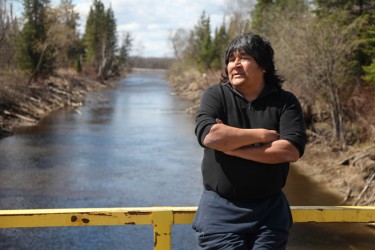Article Origin
Volume
Issue
Year
Clad in woodland camouflage pants, black shirt and Native Pride cap, Daryl Redsky stoops down on the gravel road spanning the Manitoba-Ontario boundary and lets out an excited shout as the wind picks up along what his First Nation has dubbed “Freedom Road.”
It’s the embryo of what he and others in Shoal Lake 40 hope are the isolated reserve’s long-dreamt link to the outside world, and most importantly to clean drinking water after nearly two decades under a boil-water advisory, despite sitting atop the City of Winnipeg’s tap water.
With roadworks soon poised to reach the reserve lands, there’s no plan to stop there, nor to wait for the federal government to come to the table.
Redsky, the band’s consultation coordinator, searches through the misshapen grey stones before he picks up two rocks from the road: One white quartz, the other laced with glittery pyrite. Fool’s Gold.
“At night when you rub those two rocks together, they spark,” he muses. “Nice and bright.”
Shoal Lake 40 First Nation’s battle to access clean drinking water has now sparked an ambitious $10-million fundraiser on the Internet by Winnipeg residents outraged after the federal government refused to chip in one-third of the road’s $30 million construction costs.
Rick Harp, a Winnipegger of Cree descent, was upset after a June 25 visit by Canada’s natural resources and northern Ontario development minister, Greg Rickford, failed to yield anything more than the $1 million already promised last year
towards the road’s design costs.
That caused several residents to openly weep in front of reporters, holding up signs threatening plans to expand the TransCanada Highway only 28 km northwest. “No Road for Us,
No Road for You,” read one sign held up by a local child.
“Just seeing some of the images of people of all ages in Shoal Lake 40 basically giving up hope and questioning their relationship to Canada—in the wake of the recent Truth and Reconciliation Commission report—just seemed like a golden
opportunity for Winnipeg to step up,” Harp said.
As of July 13, Harp’s online crowdfunding campaign has already netted more than $70,000 in pledges from 650 donors. It’s an all-or-nothing effort that will only see money change hands if the full $10 million is reached by the end of August.
But Rickford dodged reporters’ questions during the visit, which saw Winnipeg and Manitoba break ground for a permanent bridge they’re funding that will form a crucial part of the Freedom Road.
“Our government is pleased to work with Shoal Lake No. 40 First Nation and our other partners on the design of the Freedom Road project,” Rickford said in a press release. “This initiative will help improve the economic conditions of First Nation community members by providing all-weather road access to the Trans-Canada Highway through Manitoba.”
Shoal Lake 40 First Nation’s water problems began a century ago when the City of Winnipeg displaced the band from its historic village site to build its drinking water intake. The community was relocated onto a peninsula jutting out into Shoal Lake.
But the engineers knew the water was contaminated with tannins, compounds that can be dangerous if mixed with the chlorine with which they planned to treat the water. So they built a dyke and canal to divert the polluted water away from
Winnipeg’s source, and into Shoal Lake First Nation—dividing the reserve in two and creating a manmade island divorced from their own reserve.
Freedom Road would rejoin the two parts of Shoal Lake 40, cross over Winnipeg’s waterworks railway tracks and aqueduct, and meet the TransCanada Highway 28 km to the northwest.
Harp said he is shocked that many First Nations across Canada don’t have clean drinking water in 2015, in one of the world’s most developed countries.
“How can this be, in 2015 in Canada?” Harp said. “There’s a core injustice there. Who paid the price for that water?
“A lot hangs in the balance when it comes to this road, new hope for the future … I’m hoping that once [people] know, they act—not simply in terms of this crowdfunder, but pressuring all levels of government, including the federal government, to do right by Shoal Lake 40 and honour the source of Winnipeg’s water.”
For Daryl Redsky, the road isn’t just a way of accessing jobs, clean water and emergency services, however. It’s also become a symbol of hope for locals after decades of frustration. He said he loves bringing community elders to visit the band’s
new gravel quarry and see locals working together on a project that will benefit residents for generations to come.
“Bringing them out here gives me a good feeling because I share their happiness, their sense of something getting done and a way of getting out finally,” he said. Even if construction has reached just halfway to the TransCanada Highway, “We have
never got this far before.”
- 2799 views

